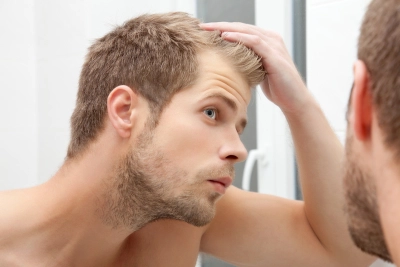 SCALP CONDITIONS
SCALP CONDITIONS
MANY PATIENTS SUFFER FROM SEVERE ITCHING, DRYNESS AND FLAKING OF THE SCALP. THESE SYMPTOMS CAN CAUSE DISTRESS AMONG SUFFERERS. HERE YOU WILL FIND INFORMATION ABOUT THE CAUSE OF THE CONDITION, TOGETHER WITH POSITIVE STEPS YOU CAN TAKE TO AVOID AND CONTROL IT.
Photo: © and.one - stock.adobe.com
-
What does a scalp condition look like?
-
What are the causes of scalp complaints?
-
What factors make the disease worse?
-
What treatment is available?
-
What measures should I take as a patient?
What does a scalp condition look like?
Many skin conditions can also manifest themselves on the scalp. Flaking, hair loss or itching are common symptoms of scalp complaints and are often chronic. A visit to a dermatologist is recommended for a full evaluation.
What are the causes of scalp complaints?
Symptoms can be based on several health conditions. Once the underlying condition has been identified, the cause and the expected success of treatment can be determined. It is important to receive a precise medical history and diagnosis from a dermatologist. A disrupted microbiome can make treatment difficult. Many of those affected have psoriasis or atopic dermatitis and as a result of this predisposition, the scalp then presents with a secondary symptom. An allergy to a substance in the environment could be the cause of symptoms on the scalp. Iron or vitamin D deficiency are also considered as possible triggers for scalp complaints. Most often, it is an individual predisposition, or an underlying disease, plus additional external influences, that lead to symptoms related to an imbalance in the skin flora itself.
What factors make the disease worse?
According to patient experience, stress is often a factor that can make things worse. Seasonal weather can also play a significant role. In summer, increased perspiration and heat build-up can stimulate the scalp flora leading to an imbalance. In winter, this same process is triggered by dry heating systems. If a tendency towards scalp problems exists, haircare products and colorants can additionally irritate the scalp. We recommend avoiding products with fragrances, as these increasingly lead to allergies (e.g. parabens, fragrance allergies).
Book your appointment in our practice in Vienna here
What treatment is available?
Before treatment can begin, it is important to determine the cause of the condition. A dermatological examination is the first step. Depending on the findings, a blood sample and a skin sample may be necessary to rule out rare diseases or infections. It is important for me to identify all possible causes of a scalp complaint. We would then aim for causal treatment after collecting all the data.
Step by step treatment options:
-First, we would begin with an anti-inflammatory and antipruritic (itch reducing) treatment, which has been proven to bring relief quickly
- Second, the barrier disturbance (an overgrowth of germs or fungi) is treated to ensure long-term stabilization
In severe cases, tablets or injections are used depending on the underlying complaint.
What measures should I take as a patient?
If you currently suffer from a scalp condition, we recommend reducing external stress and above all, avoid aggressive behaviors such as hair dyeing and hot blow-drying. Stress reduction and relaxation techniques are advised, as well as the use of mild fragrance-free shampoos and haircare products for washing and styling.



